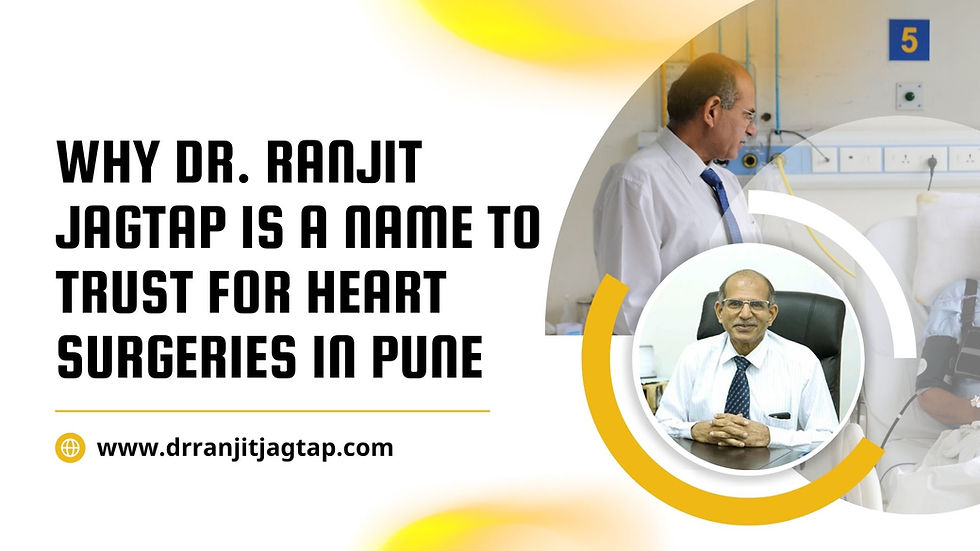How cardiac pathologists diagnose disease and find treatments at Dr Ranjit Jagtap Clinic?
- drranjitjagdap
- Oct 14, 2021
- 3 min read
Updated: Jan 24, 2022
The pathology department at the Ram Mangal Heart Foundation founded by Dr Ranjit Jagtap handles all heart-related tests in order to diagnose all heart-related diseases. They have been adapting to all of the new cardiology tests in order to help people and understand all of their heart problems.

The pathology department at Ram Mangal Heart Foundation is also responsible for the laboratory examination of body tissue samples for diagnostic purposes.
Pathology department
We've all heard the term pathology our entire lives, but how many of us understand its significance? Almost every one of us has visited a pathology lab at least once in our lives.
So, first and foremost, what exactly is pathology? The term "pathology" is derived from the Greek words "pathos," which means "suffering," and "logos," which means "study of suffering." It is a significant field in modern diagnosis and thus in overall treatment. In layman's terms, it is the study of disease.
Almost all hospitals in India and around the world rely on accurate pathological reports. It essentially serves as a bridge between medicine and science, employing cutting-edge genetics technology for improved diagnosis, screening, and treatment.
Some of our Internal Tests
CBC Test
Renal Function test
Electrolyte Analysis
Liver Function test
Routine Urine Test
Test for Lipid Profile
Hba1c Blood Sugar Level Test
It is done primarily for the benefit of the patient, but it also helps doctors, nurses, and other healthcare professionals by making the treatment process run more smoothly.
Pathology is a very broad field with over 19 different specialisations coexisting, and no two pathologists do the same work. They work in laboratories, hospitals, clinics, or pathology centres, depending on their articular specialisations, skills, and interests. In the case of complicated diseases, they frequently provide valuable advice to the doctor while also deciding on the best possible treatment.
Cardiac Pathology
Cardiac Pathology plays an important role in the diagnosis and treatment of the wide range of heart diseases and disorders seen at the Heart Institute.
Pathologists are physicians who specialise in the use of laboratory methods to diagnose and treat disease. In order to make a diagnosis, a pathologist may examine a variety of biological materials, such as heart tissue, blood, and even DNA.
Using a technique known as frozen sectioning, diagnostic pathology can sometimes be performed on the spot during cardiac surgery. While the patient is still on the operating table, a piece of tissue is removed, frozen, thinly sliced, and prepared for rapid microscopic examination by the pathologist. This rapid diagnosis can assist the surgeon in determining how to proceed with the surgery.
Along with pathologists, Dr Ranjit Jagtap Daughter, Aditi Jagtap also helps heart patients in various ways. In addition to providing diagnoses, pathologists assist in the day-to-day care of patients by monitoring the effects of treatment, such as tracking the health of a new heart following a heart transplant.
Cardiac Pathology also conducts autopsies, which are examinations of biological materials after a death. Autopsy pathology can help determine the cause of death, identify new diseases, and determine when surviving family members should screen for inherited cardiac conditions.
Cardiac Pathology is also an important component of many Heart Institute studies.
About Ram Mangal Heart Foundation
The Ram Mangal Heart Foundation founded is a world-class centre for cardiovascular medicine. They have the lowest mortality rates and the most patients in Pune and other parts of India. The hospital made 9,632 happy patients. Visit the Ram Mangal Heart Foundation for heart disease testing and treatment where Aditi Jagtap Pune also volunteers.
The specialists educate young physicians in one of the best cardiology training programmes in the country.
Many of the cardiologists are clinician-scientists who, in addition to treating patients, conduct clinical and/or laboratory research. This close relationship between science and medicine encourages new lines of research. It also accelerates the translation of new discoveries into clinical practise.





Comments